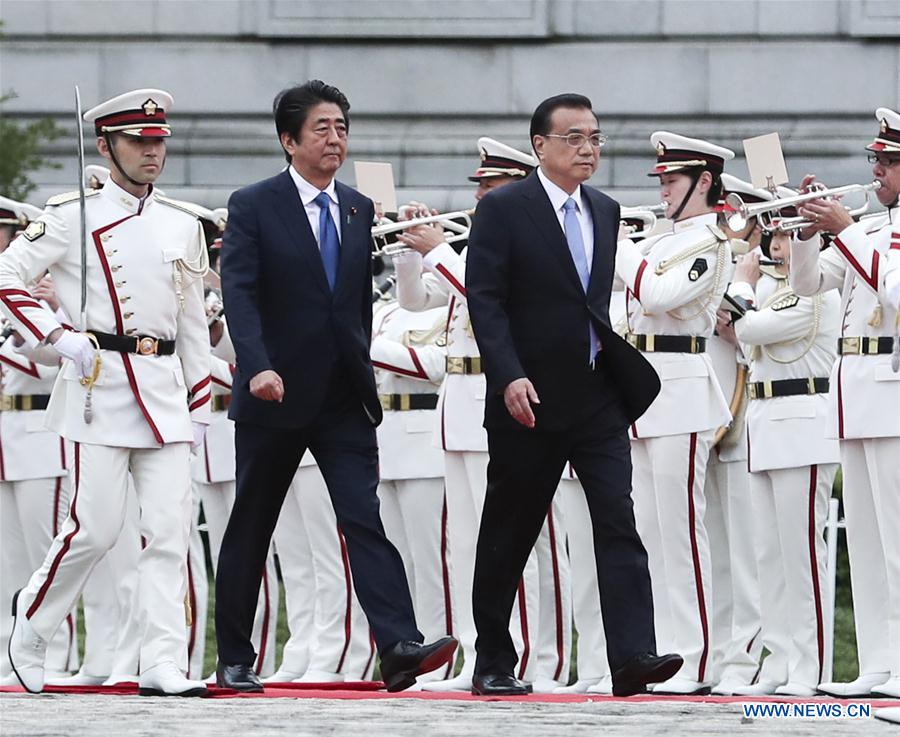Premier Li urges efforts to bring China-Japan ties back on track
Chinese Premier Li Keqiang on Wednesday called for joint efforts with Japan to keep up the positive momentum and bring bilateral ties back to the right track.
Li made the remarks during his talks with Japanese Prime Minister Shinzo Abe in Tokyo, where he was paying an official visit to Japan, the first by a Chinese premier in eight years.
Japanese Prime Minister Shinzo Abe holds a welcome ceremony for visiting Chinese Premier Li Keqiang before their talks in Tokyo, Japan, on May 9, 2018. [Photo/Xinhua]
China and Japan are each other's important neighbor and major economies in the world, and maintaining long-term, healthy and stable development of bilateral ties is in line with the interests of both countries and good for peace, stability and prosperity of the region and the world, Li said.
Over previous years China-Japan ties experienced twists and turns, but recently Japan has sent positive signals on bilateral relations, and a positive momentum is building up, added the premier.
"My visit is aimed at working with the Japanese side to bring China-Japan ties back to the right track. I hope that the two countries can meet each other halfway, and maintain long-term, healthy and stable growth of their ties," Li said.
This year marks the 40th anniversary of the signing of the China-Japan Treaty of Peace and Friendship. Li said the treaty clearly stipulates that the two countries should develop a relationship of lasting peace and friendship.
No matter how the situation changes, the two sides should stick to the principles set out in their four cornerstone political documents and follow the spirit of taking history as a mirror and looking forward into the future, Li said.
The four documents refer to the 1972 Sino-Japanese Joint Statement, the 1978 China-Japan Treaty of Peace and Friendship, the 1998 China-Japan Joint Declaration, and the 2008 joint statement on advancing strategic and mutually beneficial relations.
The Chinese premier asked both sides to maintain the political foundation of bilateral ties, properly manage disputes and jointly build a brighter future.
The Japanese government and leaders have on multiple occasions expressed willingness to face up to and reflect on history, Li said, urging the Japanese side to fulfill its commitments with actions.
The Chinese premier also urged Japan to honor its promise and stick to the one-China policy on the Taiwan issue.
Abe, in response, said Japan will only have non-governmental exchanges with Taiwan in accordance with Tokyo's agreement with Beijing.
"The two countries should maintain the stable situation in the East China Sea, and turn it into a sea of peace, cooperation and friendship," Li said.
The Chinese premier called on the two sides to view each other's development as opportunities, and translate into action their political consensus on treating each other as partners instead of threats.
Practical cooperation is an important engine and support for China-Japan relations, Li said, adding that the two economies are highly complementary.
He proposed that the two sides cement bilateral cooperation in key areas such as energy saving, technological innovation, high-end manufacturing, finance, sharing economy, health care and elderly care.
Li also suggested that the two countries carry out cooperation within the framework of the Belt and Road Initiative and jointly explore third-party markets.
The two sides have agreed in principle to sign a currency swap deal at an early date, and China has agreed to grant Japan a quota of 200 billion yuan (about 31.36 billion U.S. dollars) under the RMB Qualified Foreign Institutional Investors (RQFII) program.
The Chinese premier also called for joint efforts to enhance people-to-people friendship and beef up exchanges in culture, education, sports, media and youth as well as at local levels.
For his part, Abe said that with the resumption of a high-level economic dialogue and the exchange of visits between their foreign ministers, Japan and China have witnessed concrete improvement of bilateral ties since last year.
Japan will stick to a peaceful development path, he said, vowing to take the opportunity of Li's visit to further improve ties with China and make it more mature.
Abe pledged to strengthen political mutual trust with China, maintain high-level exchanges and enhance coordination on global and regional issues.
Japan supports China's reform and opening-up, and will continue to boost bilateral cooperation in key areas, jointly safeguard the free trade system, and expand cooperation in investment, tourism, culture, food, disaster reduction and maritime exploration.
The two leaders also conferred on the Korean Peninsula situation and other global and regional issues of common concern.
After their talks, Li and Abe witnessed the signing of several cooperation documents ranging from culture, public health and services trade to exploring third-party market cooperation and launching an air and maritime liaison mechanism.
